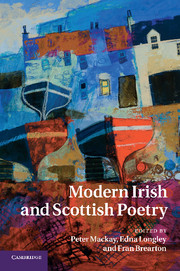Book contents
- Frontmatter
- Contents
- List of contributors
- Acknowledgements
- Introduction
- 1 Swordsmen: W. B. Yeats and Hugh MacDiarmid
- 2 Tradition and the individual editor: Professor Grierson, modernism and national poetics
- 3 Louis MacNeice among the islands
- 4 Townland, desert, cave: Irish and Scottish Second World War poetry
- 5 Affinities in time and space: reading the Gaelic poetry of Ireland and Scotland
- 6 Contemporary affinities
- 7 The Classics in modern Scottish and Irish poetry
- 8 Translating Beowulf: Edwin Morgan and Seamus Heaney
- 9 Reading in the gutters
- 10 ‘What matters is the yeast’: ‘foreignising’ Gaelic poetry
- 11 Outside English: Irish and Scottish poets in the East
- 12 Names for nameless things: the poetics of place names
- 13 Desire lines: mapping the city in contemporary Belfast and Glasgow poetry
- 14 ‘The ugly burds without wings’?: reactions to tradition since the 1960s
- 15 ‘And cannot say / and cannot say’: Richard Price, Randolph Healy and the dialogue of the deaf
- 16 On ‘The Friendship of Young Poets’: Douglas Dunn, Michael Longley and Derek Mahon
- 17 ‘No misprints in this work’: the poetic ‘translations’ of Medbh McGuckian and Frank Kuppner
- 18 Phoenix or dead crow? Irish and Scottish poetry magazines, 1945–2000
- 19 Outwith the Pale: Irish–Scottish studies as an act of translation
- Guide to further reading
- Index
- References
14 - ‘The ugly burds without wings’?: reactions to tradition since the 1960s
Published online by Cambridge University Press: 18 April 2011
- Frontmatter
- Contents
- List of contributors
- Acknowledgements
- Introduction
- 1 Swordsmen: W. B. Yeats and Hugh MacDiarmid
- 2 Tradition and the individual editor: Professor Grierson, modernism and national poetics
- 3 Louis MacNeice among the islands
- 4 Townland, desert, cave: Irish and Scottish Second World War poetry
- 5 Affinities in time and space: reading the Gaelic poetry of Ireland and Scotland
- 6 Contemporary affinities
- 7 The Classics in modern Scottish and Irish poetry
- 8 Translating Beowulf: Edwin Morgan and Seamus Heaney
- 9 Reading in the gutters
- 10 ‘What matters is the yeast’: ‘foreignising’ Gaelic poetry
- 11 Outside English: Irish and Scottish poets in the East
- 12 Names for nameless things: the poetics of place names
- 13 Desire lines: mapping the city in contemporary Belfast and Glasgow poetry
- 14 ‘The ugly burds without wings’?: reactions to tradition since the 1960s
- 15 ‘And cannot say / and cannot say’: Richard Price, Randolph Healy and the dialogue of the deaf
- 16 On ‘The Friendship of Young Poets’: Douglas Dunn, Michael Longley and Derek Mahon
- 17 ‘No misprints in this work’: the poetic ‘translations’ of Medbh McGuckian and Frank Kuppner
- 18 Phoenix or dead crow? Irish and Scottish poetry magazines, 1945–2000
- 19 Outwith the Pale: Irish–Scottish studies as an act of translation
- Guide to further reading
- Index
- References
Summary
In ‘The Beatnik and the Kailyaird’, first published in 1962, Edwin Morgan highlights the need to challenge the ‘prevailing mood of indifferentism and conservativism’ pervading Scottish literary criticism, ‘a desperate unwillingness to move out into the world’ and connect with the present both within Scotland and beyond. ‘“Scotland's heritage” is hung around our necks like a taxonomical placard. Conform or depart!’ he writes, drawing attention to the neglect of experimental writers at the expense of the more dominant stronghold of the Scottish Literary Renaissance movement and its followers. Morgan was one of the few writers and critics both to respect Scottish literary tradition and to interrogate its function. While denouncing often restrictive concepts of Scottish tradition, engagements with Scottishness nonetheless permeate his work, and in this way he adopts an interstitial position between the literary canon and its critique. Acknowledging that the ‘“Literary culture of Scotland” is a desperately plastic phrase for what people actually feel, write, speak, sing, and act’, that ‘obviously the literature of any place will remain to some extent as unamenable to encouragement as to polemic or apathy’, he admits that ‘the bristly, defensive dismissiveness of so much Scottish culture, however well-rooted it has been in real differences and real difficulties, has had a long innings and not always a very productive one, and we might as well give its opposite a chance’. Since the 1960s Morgan repeatedly provided refreshing alternatives to this perceived apathy and introversion in Scottish literary studies.
- Type
- Chapter
- Information
- Modern Irish and Scottish Poetry , pp. 238 - 250Publisher: Cambridge University PressPrint publication year: 2011



